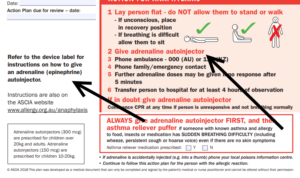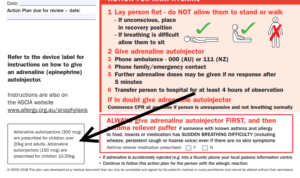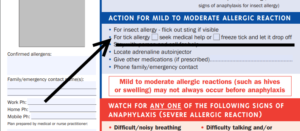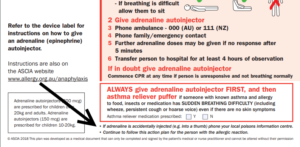Within the last week, The Australasian Society for Clinical Immunology and Allergy (ASCIA) has released a range of updated Action Plans for 2018. Why are these changes important for first aiders and what has changed? Well here is everything you need to know.
ASCIA Action Plans are an easy to follow, single page document designed to assist first aiders in the emergency treatment of someone suffering an allergic reaction, including anaphylaxis. ASCIA is the peak professional body of clinical immunology and allergy that we have in Australia and New Zealand they develops and releases the plans. Once completed by a general practitioner or nurse practitioner these action plans are then to be carried by a person that suffers allergies/anaphylaxis and/or provided to a carer of that person in case of an emergency.
New Generic Plans
 ASCIA has developed and released new generic versions of ASCIA Action Plans for Anaphylaxis. This includes both a red personalised generic plan and the orange ‘general’ plans, which are not personalised or for a specific person.
ASCIA has developed and released new generic versions of ASCIA Action Plans for Anaphylaxis. This includes both a red personalised generic plan and the orange ‘general’ plans, which are not personalised or for a specific person.
These generic plans have been developed for use with any brand of adrenaline (epinephrine) autoinjector – not just EpiPens which are the dominant brand of autoinjector in the Australian market. These plans don’t include any mention of an autoinjector brand or any brand specific instructions on the autoinjector use.
 These generic plans also include guidance on adrenaline dose when using generic auto injectors. This was included to reduce of the risk of prescribing or dispensing the incorrect dose of a generic adrenaline autoinjector. Adrenaline autoinjectors (300 mcg) are prescribed for children over 20kg and adults; Adrenaline autoinjectors (150 mcg) are prescribed for children 10-20kg.
These generic plans also include guidance on adrenaline dose when using generic auto injectors. This was included to reduce of the risk of prescribing or dispensing the incorrect dose of a generic adrenaline autoinjector. Adrenaline autoinjectors (300 mcg) are prescribed for children over 20kg and adults; Adrenaline autoinjectors (150 mcg) are prescribed for children 10-20kg.
Tick Treatment Wording Revision
 The ASCIA action plans have also changed in their advice in the treatment of ticks. This revision is designed to minimise the risk of inappropriate treatment and prevent allergic reactions to ticks. 2017 action plans included “For tick allergy – freeze dry and allow to drop off”. The updated 2018 plans include “For tick allergy seek medical help or freeze tick and let it drop off”.
The ASCIA action plans have also changed in their advice in the treatment of ticks. This revision is designed to minimise the risk of inappropriate treatment and prevent allergic reactions to ticks. 2017 action plans included “For tick allergy – freeze dry and allow to drop off”. The updated 2018 plans include “For tick allergy seek medical help or freeze tick and let it drop off”.
Recommendations for Accidental Injection of Autoinjector
 The new plans also include advice for the accidental injection of an autoinjector. This can occur in a range of scenarios including where the first aider fails to administer it correctly – i.e typically having the device upside down. The plans now include a little information section at the very bottom of the action plans with the advice “If adrenaline is accidentally injected (e.g. into a thumb) follow this action plan if a person has anaphylaxis and phone your local poisons information centre”.
The new plans also include advice for the accidental injection of an autoinjector. This can occur in a range of scenarios including where the first aider fails to administer it correctly – i.e typically having the device upside down. The plans now include a little information section at the very bottom of the action plans with the advice “If adrenaline is accidentally injected (e.g. into a thumb) follow this action plan if a person has anaphylaxis and phone your local poisons information centre”.
These are the main changes to the updated 2018 ASCIA action plans. If you still have further questions about these recent changes, ASCIA also has a Frequently Asked Questions section at their website.
Whilst the action plans are a great resource in the first aid treatment of anaphylaxis and allergic reactions, they don’t replace the need for proper first aid training. If you’d like to learn how to provide first aid for an anaphylactic reaction or how to use an autoinjector like an EpiPen, we cover this and much more at our first aid courses in Port Macquarie and Taree. We also offer group training across the Hastings, Manning/Great Lakes and the Mid North Coast – just get in touch if you’d like to organise a first aid course.
